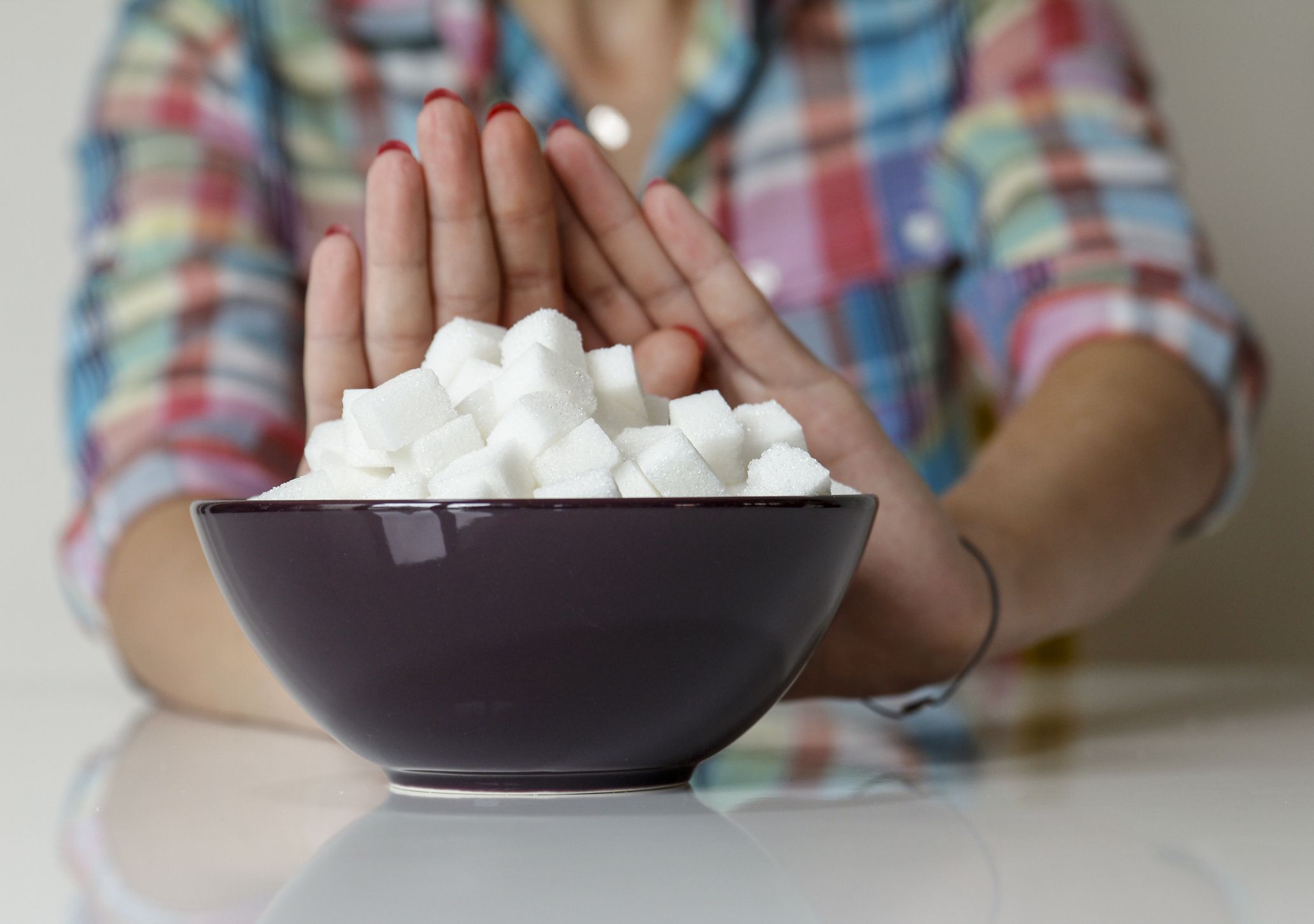SUGAR IS THE ROOT OF ALL EVIL…right? Or is this school of thought somewhat outdated? Sugar… Let’s talk about it! Since it is a very sensitive subject.
First, let’s discuss what sugar is. Sugar is a collection of carbon, hydrogen, and oxygen units that are white in appearance, and is considered glucose — a monosaccharide. The smallest units of sugar molecules are glucose, fructose, and maltose.
These “types” of sugars can be found in bread, candies/sweets, fruits, vegetables, and milk products. So, sugar exists in almost every food we eat! BUT… why does everyone say it’s bad and are there better forms of it for you?
Successfully managing sugar intake can be a challenge. For additional supportive concepts and information, see the NASM Certified Nutrition Coach course.
Curb Your Sugar Enthusiasm: 7 Tips for Cutting Back on Sugar
What if you’re trying to cut back on sugar? Are there helpful ways to curb cravings and decrease intake?
• Tip 1: Make sure you’re consuming enough calories in a day. Sugar cravings can be the result of under-fueling/under-feeding. Remember the body’s preferred fuel source is sugar! If you’re starving yourself, it’s natural to have a sweet tooth.
• Tip 2: Consume more protein! Protein is an extremely satiating nutrient and higher intakes have been known to curb sugar cravings.
• Tip 3: Replace table sugar with natural sources. Honey and stevia are natural sweeteners that are a better alternative to traditional table sugar.
• Tip 4: Consume more whole foods, especially vegetables! Whole food diets are rich in vitamins, minerals, and FIBER. Fiber is filling and can help cut back on sugar intake and decrease cravings.
• Tip 5: Replace sodas and sweetened drinks with flavored sparkling water or make your fruit-infused water.
• Tip 6: Cut back on sugar servings when baking! Replacing sugar with spices such as cinnamon or nutmeg can easily replace the sweetness you are trying to achieve.
• Tip 7: Opt for calorie-free, artificial sweeteners in sodas, baked goods, and other items that commonly have “added sugar.” But are artificial sweeteners bad for you? There is some debate that certain artificial sweeteners have been linked to various health issues and can severely disrupt the gut microbiome. However, a personal risk assessment should always be conducted before making choices to consume food alternatives.
In the case of someone who needs to lower their daily sugar intake but struggles to cut out their favorite sodas… artificial sweeteners may be a viable option. Or perhaps a diabetic that is managing blood sugar levels. Overall, the mission is to find an alternative that can be easily adhered to.
You Actually Need Sugar
The body’s preferred fuel source for energy is SUGAR or glucose. Regardless of if you consume candy or vegetables, the body will turn what available carbohydrates or complex sugar molecules into glucose. Glucose is what powers almost every single movement you do in a day, keeps your brain active, and can be stored in the body’s muscles and liver.
Now depending on the type of food consumed, other nutrients such as fiber (that’s found in whole grains, fruits, and vegetables) can slow the digestion and release of sugar into the blood. The rate at which sugar appears in the blood from consuming various foods is what we refer to as the glycemic index.
Simple sugars such as juices or candies will raise your blood sugar quickly (high glycemic index), while complex sugars such as sweet potatoes or whole grains will only cause moderate raises in blood sugar (low glycemic index). Depending on your overall health goals, both can serve a purpose in your diet. However, most health guidelines advise choosing complex sugars over simple sugars. And here’s why…
If you go to the doctor they can test for sugars in your blood, and there is an ideal range for blood sugar regardless of if you are fasting or after you have consumed a meal. Ideally, sugar should not remain in your bloodstream for long periods. If sugar exists in high concentrations in the blood, that means it’s not being transferred into our cells to be used for energy. When the body is unable to do this efficiently, it is called insulin resistance (the hormone that acts as a lock and key to let sugar molecules into cells).
Join the Resistance
Insulin resistance can either be a genetic disorder (Type-1 diabetes) or can be the result of consuming too much sugar in the diet and not participating in enough exercise to combat the high levels in the blood (Type-2 Diabetes). When sugar consumption is very high it can decrease the elasticity of blood vessels, causing them to narrow and disrupt blood flow.
Lack of blood flow can lead to larger vessels becoming damaged which can lead to high blood pressure and ultimately increase the risk of heart disease. Other issues that can accompany high sugar consumption include obesity, hormone dysfunction, neuropathy, nerve damage, and kidney disease.
So, is sugar the devil? No! But it can be if too much is consumed, and not enough activity takes place to offset the extra consumption.
The Struggle is Real
What if you’re struggling to manage your sugar cravings?
If you are struggling to manage cravings, allow yourself to indulge in a small serving of your favorite sweet treat every day! The best way to prevent overindulgence is by allowing flexibility in your diet to have that one small cookie, one small slice of cake, or 2 squares of a chocolate bar.
There is always room to include your favorite sweet treat if it is in moderation. Another tip? Try combining that sweet treat with a piece of fruit. Making the connection of having something sweet with something fresh and more filling can help you from overeating tons of extra sugar.
It’s All Natural
What about natural sugar? Is it just the same as regular sugar? Well… yes and no. Remember, it is not so black and white. As aforementioned, there are several “types” of sugar, but in the end, everything gets turned into glucose. The caveat? When you consume fruits, you are also consuming various vitamins and minerals essential for health, growth, and development.
Added health benefits that regular table sugar, candies, and pastries are completely devoid of. The most important thing to note between consuming natural sugars and regular sugar is that the health benefits are greatest when consuming whole fruits. Whole fruits are rich in fiber, the nutrient that is not only needed for optimal digestive health but also slows the release of sugars into your blood to prevent massive spikes.
The moral of the story? Sugar is not the devil and deserves a place in your diet regardless of your health and fitness routine. When it comes to sugar, the truth is no single individual needs THAT MUCH (unless you are running a marathon every day).
Therefore, eliminating extra sources that are found in many commercial products can help with weight management and healthy blood markers. Fresh is always best and opting for natural sources that are commonly found in fruits and vegetables is a great way to ensure you are cutting back on sugar and providing your body with the additional vitamins and minerals it needs to thrive.



